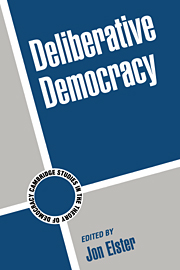Book contents
- Frontmatter
- Contents
- List of Contributors
- Preface and Acknowledgment
- Introduction
- 1 “Claro!”: An Essay on Discursive Machismo
- 2 Deliberation as Discussion
- 3 All Men Are Liars: Is Democracy Meaningless?
- 4 Deliberation and Constitution Making
- 5 Pathologies of Deliberation
- 6 Deliberation and Ideological Domination
- 7 Arguing for Deliberation: Some Skeptical Considerations
- 8 Democracy and Liberty
- 9 Health-Health Trade-offs
- 10 Full Representation, Deliberation, and Impartiality
- Index
1 - “Claro!”: An Essay on Discursive Machismo
Published online by Cambridge University Press: 05 June 2012
- Frontmatter
- Contents
- List of Contributors
- Preface and Acknowledgment
- Introduction
- 1 “Claro!”: An Essay on Discursive Machismo
- 2 Deliberation as Discussion
- 3 All Men Are Liars: Is Democracy Meaningless?
- 4 Deliberation and Constitution Making
- 5 Pathologies of Deliberation
- 6 Deliberation and Ideological Domination
- 7 Arguing for Deliberation: Some Skeptical Considerations
- 8 Democracy and Liberty
- 9 Health-Health Trade-offs
- 10 Full Representation, Deliberation, and Impartiality
- Index
Summary
Among coachmen, as among us all, whoever starts shouting at others with the greatest self-assurance, and shouts first, is right.
Lev TolstoyI delight in talking politics. I talk them all day long.
But I can't bear listening to them.
Oscar WildeDeliberation has been described, minimally, as “a conversation whereby individuals speak and listen sequentially” before making a collective decision. Deliberative “conversations” fall somewhere between two extremes: bargaining, which involves exchanging threats and promises, and arguing, which concerns either matters of principle or matters of fact and causality. Discussions about the latter may occur even when ends are shared but views diverge as to the best means. The aim of arguing, unlike that of bargaining, is to persuade others of the value of one's views. Typically, both arguing and bargaining enter the deliberative process. Since arguments can also be put forward manipulatively for covert bargaining purposes, it is sometimes arduous to separate one form of deliberation from the other. However, the cynical reduction of arguing to a special case of strategic bargaining does not do: as Elster maintains, argument, even if hypocritical, has a powerful civilizing influence (1993; see also Chapter 4, this volume). If we accept this view, the extent to which a democracy can successfully deliberate by arguing rather than just by bargaining makes a great deal of difference. In this essay I consider some of the behavioral conditions required for successful deliberation.
- Type
- Chapter
- Information
- Deliberative Democracy , pp. 19 - 43Publisher: Cambridge University PressPrint publication year: 1998
- 55
- Cited by



